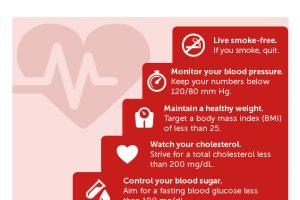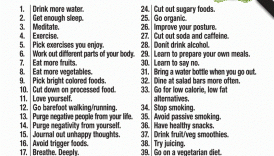Unlocking the Secrets to a Strong and Healthy Heart

Introduction to Heart Health
Heart health is a fundamental aspect of overall well-being that often doesn’t receive the attention it deserves. The heart is not just a muscular organ; it acts as the body’s engine, pumping blood and oxygen to every cell, allowing us to live active and fulfilling lives. Understanding the importance of a strong heart helps emphasize the need for proactive measures to protect it.
- Unlocking the Secrets to a Strong and Healthy Heart
- Introduction to Heart Health
- Understanding the Importance of a Strong Heart
- Common Risk Factors for Heart Disease
- Diet and Nutrition for a Healthy Heart
- Top Superfoods for Heart Health
- The Impact of Salt and Sugar on Heart Health
- Exercise and Physical Activity for a Stronger Heart
- Cardiovascular Workouts for Heart Health
- Strength Training for a Healthy Heart
- Stress Management and Mental Well-being
- The Connection Between Stress and Heart Disease
- Techniques for Managing Stress and Promoting Heart Health
- Sleep and Heart Health
- Importance of Quality Sleep for a Strong Heart
- Tips for Improving Sleep for Better Heart Health
Understanding the Importance of a Strong Heart
Maintaining a healthy heart is crucial for longevity and quality of life. A strong heart ensures:
- Efficient Blood Circulation: Optimal delivery of nutrients and oxygen to cells.
- Reduced Risk of Diseases: Lower likelihood of heart disease, heart attacks, and strokes.
- Enhanced Physical Performance: Increased stamina and less fatigue during daily activities.
Remember an instance when you felt energized after a long walk or brisk run? That’s your heart working efficiently, showcasing its capabilities. Conversely, when heart health is compromised, every activity can feel like a struggle, stemming from reduced blood flow and energy levels.
Common Risk Factors for Heart Disease
Recognizing the common risk factors for heart disease is essential in cultivating preventive habits. Here are some key risk factors to be aware of:
- High Blood Pressure: Often dubbed the “silent killer,” consistently high levels can strain the heart.
- High Cholesterol: An imbalance in cholesterol can lead to plaque buildup in arteries, increasing the risk of heart attacks.
- Obesity: Excess weight places additional strain on the heart and can lead to diabetes, which complicates heart health.
- Sedentary Lifestyle: Low levels of physical activity can weaken the heart and lead to several health complications.
- Unhealthy Diet: Diets high in saturated fats, sugars, and salt can negatively impact heart health.
- Smoking and Alcohol Intake: Both can damage blood vessels and lead to chronic health issues over time.
- Family History and Age: Genetics can play a significant role in heart disease susceptibility.
Understanding these risk factors enables individuals to identify areas of their life that may require change, facilitating a path to a stronger, healthier heart. With better awareness comes the power to act, leading to improved health outcomes. This introduction lays the foundation for how diet, exercise, stress management, and sleep can further bolster heart health.
Diet and Nutrition for a Healthy Heart
With a foundational understanding of heart health established, it’s now essential to dive into the vital role diet and nutrition play in maintaining a healthy heart. The food choices one makes can significantly influence heart health, making it imperative to focus on nutrient-rich foods.
Top Superfoods for Heart Health
Superfoods are power-packed sources of nutrition that can help keep the heart in prime condition. Including these in your diet is a delicious way to support cardiovascular health. Here are some of the top superfoods to consider:
- Fatty Fish: Rich in omega-3 fatty acids, salmon, mackerel, and sardines can help lower triglyceride levels and reduce the risk of heart disease.
- Berries: Blueberries, strawberries, and raspberries are high in antioxidants, which help combat oxidative stress and inflammation.
- Leafy Greens: Spinach, kale, and collard greens are packed with nutrients and vitamins that help support arterial health.
- Nuts and Seeds: Almonds, walnuts, flaxseeds, and chia seeds are excellent sources of healthy fats and fiber, which can lower cholesterol levels.
- Whole Grains: Foods like oatmeal, quinoa, and brown rice are full of fiber that aids in reducing cholesterol and improving heart health.
Think of a colorful salad loaded with leafy greens, berries, nuts, and a drizzle of olive oil – a simple yet powerful meal for your heart!
The Impact of Salt and Sugar on Heart Health
While embracing heart-healthy superfoods is essential, awareness of certain dietary culprits like salt and sugar is equally important. Excessive intake of these can worsen heart conditions. Here’s how:
- Salt: High sodium intake can raise blood pressure, leading to an increased risk of heart disease. It’s advisable to limit sodium to less than 2,300 milligrams per day.
- Sugar: Added sugars can contribute to obesity, inflammation, and higher triglyceride levels, increasing the likelihood of heart-related issues. Aim to limit added sugars to less than 10% of daily calories.
Practical tips for reducing salt and sugar include reading food labels carefully, cooking at home with fresh ingredients, and choosing healthy alternatives. If you’ve ever craved a sugary snack, consider reaching for a piece of fruit instead—it’s not only sweeter but also packs additional nutrients. By honing in on nutrient-rich foods and being mindful of salt and sugar intake, one can take meaningful steps toward fostering a heart-healthy lifestyle. The next step will involve exploring the benefits of regular exercise and physical activity for the heart.
Exercise and Physical Activity for a Stronger Heart
With a solid foundation in diet and nutrition, it’s crucial to highlight the impact of regular exercise and physical activity on heart health. Just as the right foods nourish the heart, consistent physical activity strengthens the organ, enhancing its function and reducing disease risk.
Cardiovascular Workouts for Heart Health
Cardiovascular workouts, also known as aerobic exercise, play a pivotal role in boosting heart health. These exercises elevate the heart rate, improve circulation, and increase endurance. Here are some effective cardiovascular activities to consider:
- Walking or Jogging: Simply hitting the pavement or treadmill can do wonders. Regular brisk walks or jogs keep the heart pumping and enhance cardiovascular fitness.
- Cycling: Whether on a stationary bike or cycling outdoors, this low-impact activity improves heart health while being gentle on the joints.
- Swimming: Engaging in swimming sessions works the whole body without stressing the joints, making it an excellent choice for heart health.
- Dancing: Not only a fun way to socialize, but dance forms like Zumba also provide a sturdy cardio workout while lifting spirits.
For a personal touch, consider my friend who has embraced cycling; she finds that not only has her heart health improved, but she also enjoys the peace of mind that comes with being outdoors, surrounded by nature.
Strength Training for a Healthy Heart
While cardiovascular workouts are critical, incorporating strength training into one’s routine also offers significant heart benefits. Here’s how strengthening exercises complement cardiovascular activities:
- Improved Muscle Mass: Building lean muscle helps increase metabolism, enabling the body to burn calories more efficiently.
- Better Blood Sugar Control: Strength training aids in regulating blood sugar levels, which is crucial for preventing heart disease and diabetes.
- Enhanced Blood Pressure Control: Regular resistance training has been shown to promote lower blood pressure over time.
Examples of effective strength training exercises include:
- Bodyweight Exercises: Push-ups, squats, and lunges can be performed anywhere and ease into a manageable routine.
- Weight Lifting: Using free weights or resistance bands can boost strength and offer versatile workout options.
Striking a balance between cardiovascular workouts and strength training fosters a holistic approach to heart health. Next, we will explore stress management techniques and their impact on the heart’s well-being.
Stress Management and Mental Well-being
As we transition from the physical aspects of heart health, it’s crucial to address the often overlooked but significantly impactful component of mental well-being—stress management. Understanding the relationship between stress and heart health is vital for a holistic approach to maintaining cardiovascular fitness.
The Connection Between Stress and Heart Disease
Stress is an inevitable part of life, but chronic stress can be detrimental to heart health. When under stress, the body releases hormones like adrenaline and cortisol, which can lead to:
- Increased Heart Rate: Stress triggers the body to pump blood faster, potentially leading to high blood pressure.
- Inflammation: Continuous stress can cause inflammation in the body, contributing to arterial damage and plaque buildup.
- Unhealthy Coping Mechanisms: Stress can lead to poor lifestyle choices, such as overeating, sedentary behavior, smoking, or alcohol consumption, all of which negatively impact heart health.
Reflecting on past experiences, many individuals can relate to stress-induced habits; for instance, turning to junk food or skipping workouts during hectic periods. It’s essential to recognize these patterns and address them proactively.
Techniques for Managing Stress and Promoting Heart Health
Fortunately, there are numerous techniques to manage stress effectively, promoting not only mental well-being but also heart health. Here are some methods to consider:
- Mindfulness and Meditation: Practicing mindfulness or deep-breathing exercises can help center thoughts and calm the mind. Even a few minutes a day can yield significant benefits.
- Regular Physical Activity: Engaging in exercise, whether it’s a brisk walk or a fun dance class, releases endorphins that combat stress and improve mood.
- Adequate Sleep: Prioritizing quality sleep is vital for overall health and stress reduction—aim for 7 to 9 hours each night.
- Healthy Social Connections: Spending time with friends or family can provide emotional support and laughter, both powerful stress relievers.
- Journaling: Writing down thoughts and feelings can help clarify emotions and reduce stress by providing an outlet for expression.
As demonstrated by countless studies, managing stress is a necessary step toward fostering heart health. With attention to both mental and physical well-being, individuals can create a balanced lifestyle that effectively supports durability against heart disease. The next consideration will be the importance of sleep and how it influences heart health.
Sleep and Heart Health
Continuing from the discussion on stress management, another crucial element that directly impacts heart health is quality sleep. The relationship between sleep and cardiovascular wellness is profound, highlighting the necessity for proper rest as part of a heart-healthy lifestyle.
Importance of Quality Sleep for a Strong Heart
Quality sleep is essential for several reasons that directly benefit heart health:
- Regulation of Blood Pressure: A good night’s rest helps maintain optimal blood pressure levels. During deep sleep, heart rates and blood pressure naturally drop, which, when consistent, allows the heart to recuperate.
- Hormonal Balance: Sleep affects the balance of hormones like cortisol and adrenaline, both of which play roles in stress management and overall heart health.
- Reduced Inflammation: Lack of sleep increases inflammation in the body, which is linked to heart disease and other cardiovascular conditions.
Think about those days when fatigue sets in—you might notice increased irritability and cravings for unhealthy foods. My friend found that after consistently getting good sleep, not only did her mood improve, but so did her focus during workouts and daily tasks.
Tips for Improving Sleep for Better Heart Health
Prioritizing sleep can lead to significant improvements in cardiovascular health. Here are some practical tips to enhance sleep quality:
- Create a Sleep Schedule: Going to bed and waking up at the same time daily can reinforce the body’s natural sleep-wake cycle.
- Limit Screen Time Before Bed: The blue light emitted by smartphones and computers can interfere with the body’s melatonin production, making it harder to fall asleep.
- Establish a Relaxation Routine: Engage in calming activities before bedtime, such as reading, taking a warm bath, or practicing gentle stretches.
- Invest in a Comfortable Sleep Environment: Ensure your bedroom is dark, quiet, and at a comfortable temperature. A good mattress and pillows can also significantly impact sleep quality.
- Limit Caffeine and Alcohol Intake: Both substances can disrupt sleep patterns. Aim to avoid them in the hours leading up to bedtime.
By paying attention to sleep hygiene, individuals can foster deeper, more restorative sleep cycles that benefit not only heart health but overall well-being. With this connection established, it’s clear that each element of a heart-healthy lifestyle—nutrition, exercise, stress management, and sleep—is interwoven, forming a supportive network for a healthier heart.




